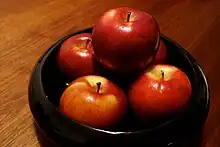Empire (apple)
Empire is the name of a clonally propagated cultivar of apple derived from a seed grown in 1945 by Lester C. Anderson, a Cornell University fruit nutritionist who conducted open pollination research on his various orchards.[1] In 1945, under the direction of A. J. Heinicke, scientists from the New York State Agricultural Experiment Station of Cornell University in Geneva, New York, harvested the Empire seed together with thousands of its siblings.[1] The Geneva teams grew and tested ever dwindling sub-populations of the sibling group until 1966, when the final selection, the Empire, was released to the public at the New York Fruit Testing Association meetings in Geneva.[1] According to the US Apple Association website it is one of the fifteen most popular apple cultivars in the United States.[2]
| Malus domestica 'Empire' | |
|---|---|
 Empire apples | |
| Hybrid parentage | 'McIntosh' × 'Red Delicious' |
| Cultivar | 'Empire' |
| Origin | |
Description
Apples are picked between September and October and can be stored until January. However, some apple growers including Verger Denis Charbonneau Mont-St-Grégoire, Quebec, Canada easily keep them until June under controlled refrigeration in a gas atmosphere. They still remain juicy, firm, crunchy and sweet.
The original seed was a cross between the varieties McIntosh and Red Delicious. Empire apples are excellent for eating and salads, and good for sauce, baking, pies and freezing.[3] It is an ideal lunch-box apple, not least because it does not bruise easily.[4]
Sports patented in the US
By the year 2001, three mutant cultivars (sports) of Empire had received US plant patents. None of them were mutants of mutants:
| Date | "Inventor" | Marketed as | Assignee | Earlier | Color | Plant patent number |
| Mar 10, 1992 | Harold F. Teeple, Russel H. Teeple, John B. Teeple | Teeple Red Empire, Royal Empire | Cornell | No | redder | US plant patent 7820 |
| Oct 20, 1992 | Harold Thome | TF808 | Inter-Plant Patent Marketing | 5—7 days | redder | US plant patent 8010 |
| Feb 1, 2000 | Jeffrey D. Crist | CB515, Crown Empire | Adams County Nursery | 2.5 weeks | redder | US plant patent 11201 |
References
- McCandless, Linda (1996). "Experiment Station's successful Empire apple has its 30th birthday". Cornell Chronicle. Cornell University. Archived from the original on 2007-08-14. Retrieved 2007-10-13.
- Apple varieties by US Apple Association
- "Apple varieties". Archived from the original on 2012-10-01.
- "Empire apples".
- Dr. Stephen Miller of the USDA Fruit Research Lab in Kearneysville, West Virginia.
External links
- NY Apple country Archived 2012-09-01 at the Wayback Machine
- National Fruit Collection page